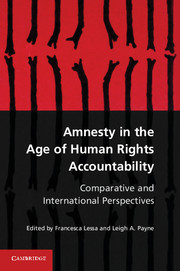Foreword
Published online by Cambridge University Press: 05 June 2012
Summary
I am immensely grateful for the opportunity the editors of this book have given me to contribute this foreword. More than that, I am proud to be part of an effort to bring about an honest and thoughtful conversation about peace, justice, and reconciliation, a conversation that in the past has been marked by useless recrimination and accusation. Just as peace should not be pursued at the cost of forcing victims to abandon all hope of seeing justice done, human rights activists also have the responsibility to reckon with the fact that war itself is the ultimate violation of human dignity and the occasion for more and more tragic abuses. This book elevates the discussion well above where it has been until now.
The body of international law on amnesties has evolved significantly over the last quarter century. First, the era of complete and absolute deference to the state as it reckons with how to deal with serious human rights violations and international crimes has come to a close. Second, a state is no longer entitled to exercise absolute discretion regarding the manner in which it chooses to address the legacies of its past when these amount to grave human rights violations and international crimes. Newly formed democratic governments looking to implement clemency and reconciliation measures can no longer do so through amnesties that prevent victims from enjoying certain fundamental rights or that further a state of impunity. Instead, in recent decades, countries have implemented transitional justice mechanisms to address massive and systematic violations of fundamental rights, including criminal prosecutions, truth commissions, reparations programs, and institutional reform.These innovative state practices amount to a paradigmatic shift in the way societies reckon with legacies of human rights violations.
- Type
- Chapter
- Information
- Amnesty in the Age of Human Rights AccountabilityComparative and International Perspectives, pp. xvii - xxixPublisher: Cambridge University PressPrint publication year: 2012
References
- 2
- Cited by

